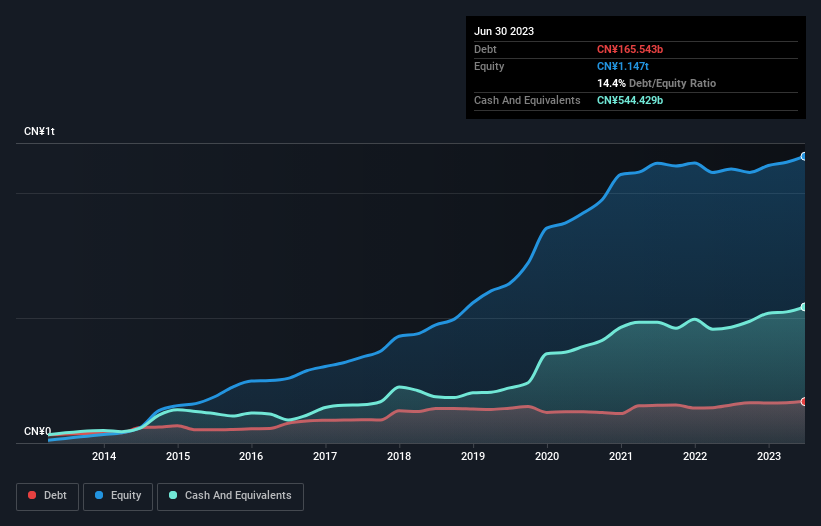Is Alibaba Group Holding (NYSE:BABA) Using Too Much Debt?

Some say volatility, rather than debt, is the best way to think about risk as an investor, but Warren Buffett famously said that 'Volatility is far from synonymous with risk.' So it seems the smart money knows that debt - which is usually involved in bankruptcies - is a very important factor, when you assess how risky a company is. We can see that Alibaba Group Holding Limited (NYSE:BABA) does use debt in its business. But is this debt a concern to shareholders?
What Risk Does Debt Bring?
Generally speaking, debt only becomes a real problem when a company can't easily pay it off, either by raising capital or with its own cash flow. Ultimately, if the company can't fulfill its legal obligations to repay debt, shareholders could walk away with nothing. However, a more common (but still painful) scenario is that it has to raise new equity capital at a low price, thus permanently diluting shareholders. Of course, the upside of debt is that it often represents cheap capital, especially when it replaces dilution in a company with the ability to reinvest at high rates of return. The first thing to do when considering how much debt a business uses is to look at its cash and debt together.
See our latest analysis for Alibaba Group Holding
How Much Debt Does Alibaba Group Holding Carry?
You can click the graphic below for the historical numbers, but it shows that as of June 2023 Alibaba Group Holding had CN¥165.5b of debt, an increase on CN¥152.0b, over one year. However, it does have CN¥544.4b in cash offsetting this, leading to net cash of CN¥378.9b.

How Healthy Is Alibaba Group Holding's Balance Sheet?
The latest balance sheet data shows that Alibaba Group Holding had liabilities of CN¥380.2b due within a year, and liabilities of CN¥249.5b falling due after that. Offsetting these obligations, it had cash of CN¥544.4b as well as receivables valued at CN¥64.1b due within 12 months. So it has liabilities totalling CN¥21.2b more than its cash and near-term receivables, combined.
This state of affairs indicates that Alibaba Group Holding's balance sheet looks quite solid, as its total liabilities are just about equal to its liquid assets. So it's very unlikely that the CN¥1.73t company is short on cash, but still worth keeping an eye on the balance sheet. Despite its noteworthy liabilities, Alibaba Group Holding boasts net cash, so it's fair to say it does not have a heavy debt load!
In addition to that, we're happy to report that Alibaba Group Holding has boosted its EBIT by 39%, thus reducing the spectre of future debt repayments. There's no doubt that we learn most about debt from the balance sheet. But ultimately the future profitability of the business will decide if Alibaba Group Holding can strengthen its balance sheet over time. So if you're focused on the future you can check out this free report showing analyst profit forecasts.
But our final consideration is also important, because a company cannot pay debt with paper profits; it needs cold hard cash. While Alibaba Group Holding has net cash on its balance sheet, it's still worth taking a look at its ability to convert earnings before interest and tax (EBIT) to free cash flow, to help us understand how quickly it is building (or eroding) that cash balance. Happily for any shareholders, Alibaba Group Holding actually produced more free cash flow than EBIT over the last three years. There's nothing better than incoming cash when it comes to staying in your lenders' good graces.
Summing Up
We could understand if investors are concerned about Alibaba Group Holding's liabilities, but we can be reassured by the fact it has has net cash of CN¥378.9b. And it impressed us with free cash flow of CN¥170b, being 134% of its EBIT. So is Alibaba Group Holding's debt a risk? It doesn't seem so to us. The balance sheet is clearly the area to focus on when you are analysing debt. But ultimately, every company can contain risks that exist outside of the balance sheet. Case in point: We've spotted 1 warning sign for Alibaba Group Holding you should be aware of.
When all is said and done, sometimes its easier to focus on companies that don't even need debt. Readers can access a list of growth stocks with zero net debt 100% free, right now.
New: Manage All Your Stock Portfolios in One Place
We've created the ultimate portfolio companion for stock investors, and it's free.
• Connect an unlimited number of Portfolios and see your total in one currency
• Be alerted to new Warning Signs or Risks via email or mobile
• Track the Fair Value of your stocks
Have feedback on this article? Concerned about the content? Get in touch with us directly. Alternatively, email editorial-team (at) simplywallst.com.
This article by Simply Wall St is general in nature. We provide commentary based on historical data and analyst forecasts only using an unbiased methodology and our articles are not intended to be financial advice. It does not constitute a recommendation to buy or sell any stock, and does not take account of your objectives, or your financial situation. We aim to bring you long-term focused analysis driven by fundamental data. Note that our analysis may not factor in the latest price-sensitive company announcements or qualitative material. Simply Wall St has no position in any stocks mentioned.
About NYSE:BABA
Alibaba Group Holding
Through its subsidiaries, provides technology infrastructure and marketing reach to help merchants, brands, retailers, and other businesses to engage with their users and customers in the People's Republic of China and internationally.
Excellent balance sheet and good value.
Similar Companies
Market Insights
Community Narratives



